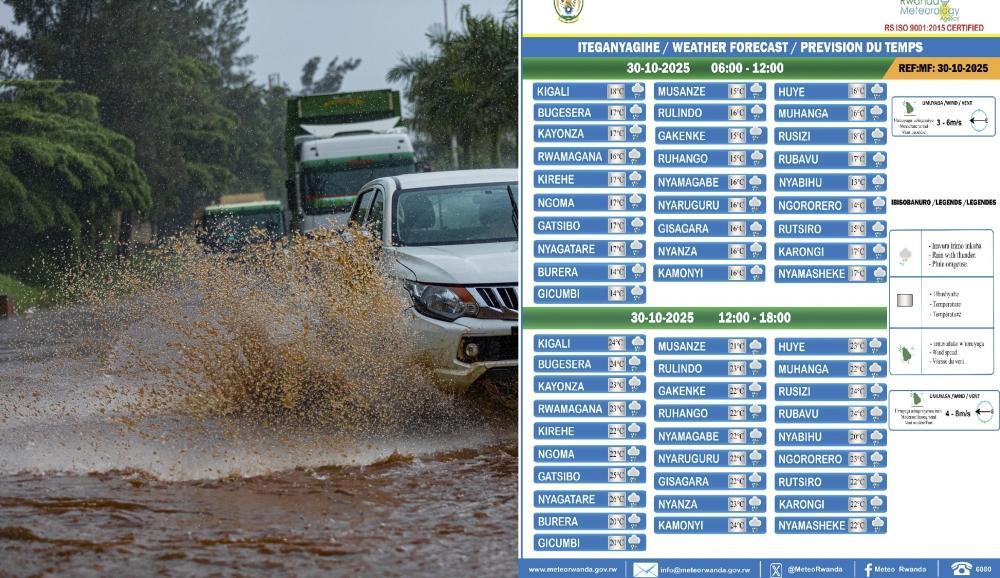Africa-Press – Rwanda. The Rwanda Meteorology Agency is considering introducing a fee for private companies that profit from using meteorological data.
Speaking before the parliamentary committee on land, agriculture, livestock, and environment on October 29, Aimable Gahigi, the agency’s Director General, said while weather and climate information is currently offered at no cost, several private firms use it for profit-making ventures without contributing any returns to the national treasury.
“Even though we provide meteorological data for free, some sectors, such as insurance companies, use it to make profits. Yet, the law does not currently indicate how such users should contribute back to government revenue,” Gahigi told lawmakers.
He added that Meteo Rwanda is exploring a cost recovery system that could ensure that commercial beneficiaries of weather data share the financial responsibility of maintaining meteorological services.
He explained that the proposed framework would primarily target profit-driven users such as insurers, engineering firms, construction companies, and large-scale farmers. He said public safety information and essential forecast data would remain freely accessible to the general public.
Anthony Twahirwa, head of weather and climate services implementation at Meteo Rwanda, noted that charging for commercial use of weather data is a common practice globally.
“In many countries, users of meteorological information for profit do pay. For example, in aviation, there is usually a charge of about one dollar per passenger,” he said.
According to the agency, the demand for weather and climate information in Rwanda has sharply increased amid the growing impacts of climate change.
Gahigi stressed that maintaining and upgrading meteorological infrastructure, such as radars, automatic weather stations, and data servers, requires significant resources and the current model of providing the services free of charge is not sustainable.
“The equipment we use requires regular calibration, often done abroad since there are no calibration centers in Rwanda. Spare parts are also costly. While our data should remain free for public safety, the systems that generate it need continuous investment,” he said.
Aviation remains one of the largest consumers of meteorological information. Both domestic and international airlines depend on real-time weather updates for safe and efficient operations.
Gahigi said developing a fair cost recovery mechanism would not only help ensure sustainability but also improve service quality and reliability.
“The challenge is to design a practical system that allows Meteo Rwanda to maintain high-quality, timely, and reliable meteorological services for all users,” he said.
Gahigi said that the proposed initiative is not meant to commercialize life-saving information but to ensure its continuity. He said the law determining the mandate and responsibilities of the weather agency needs to be appealed before the proposed cost recovery system can be established.
“Meteorological data saves lives, and no one should ever be denied access to it. But where it generates profit, there should be a fair return to sustain the systems that produce it,” he said.
The agency is also upgrading its infrastructure to strengthen forecast accuracy. A new Upper Air Station has been set up in Huye District and is expected to be operational before the end of the year. It will enhance data collection for aviation, drone operations, and the Rwanda Space Agency.
Meanwhile, the Doppler weather radar at Maranyundo Hill in Bugesera District, first installed in 2015, is being upgraded to improve real-time monitoring and storm tracking.
“This radar helps us understand what happens inside clouds, detect storm intensity, and forecast severe weather events. It will also play a critical role in supporting operations of the upcoming international airport in Bugesera,” Gahigi explained.
The house committee chairperson, Alice Muzana, supported the proposal to charge some services by Meteo Rwanda, saying that weather data carries significant economic value that could be leveraged to bridge financial gaps.
“Meteo Rwanda needs adequate resources to deliver on its mandate. It’s reasonable that those benefiting commercially contribute to its sustainability,” she said.
MP Jean René Niyorurema also called for stronger investment in modern meteorological tools, stressing that reliable data is crucial for public trust and effective disaster preparedness.
For More News And Analysis About Rwanda Follow Africa-Press






